Supermarkets from across Europe have signed the Brussels Soy Declaration to state that they want EU consumers and farmers to have a choice to eat and use non-gmo soy, this comes soon after the announcement by some UK supermarkets that they would be using GM Soy in animal feed for the first time.
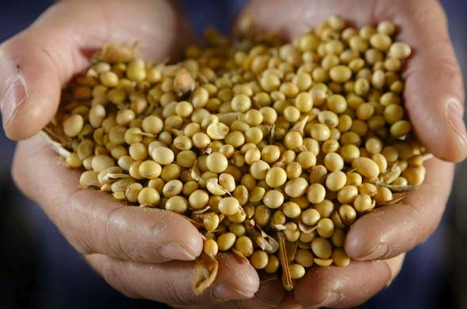
The Brussels Soy Declaration
(Follow Sustainable Pulse on Facebook to get updates on this shock declaration)
Some Member States of the European Union have passed national regulations that enable food producers and manufacturers as well as brand owners and retailers to label food items as GMO-free in the respective national languages. Consumers are thus given a clear choice they can exercise in the supermarket. Where implemented, such regulations have sometimes caused a significant increase in the sale of food products labeled accordingly. Consequently, the demand for certified non-GM ingredients is rising.
For animal products (milk, eggs, meat), soybeans or soy meal mainly imported from overseas represent the single largest component through which GMOs wind up in feeding troughs and thus in the supply chain. Brazil is by far the world’s largest producer of soybeans that are NOT genetically modified. The largest part of the soy products that are sold globally and labeled as GMO-free originates in Brazil. Whether the European food industry, food retail industry and consumers will continue to have a choice in future will therefore depend almost entirely on decisions taken by the Brazilian soy industry.
A significant influence is exercised by other operators in the supply and production chains that usually take soy ingredients to the consumer. The signatories of this Declaration include representatives of the industries that use soy in their food and livestock production, as well as representatives of the European food retail industry, which provide consumers with food products every day.
In recognition of the aforementioned facts, the signatories, being aware that:
- Brazil is currently by far the most important producer of GMO-free soybeans,
- in 2005 Brazilian law legalized the planting of GM soybeans,
- since 2005 the percentage of conventional, non-GMO, soybeans in the Brazilian overall crop volume has continued to decrease year by year,
- this development is the consequence of an increased demand from China for GMO soy that causes the redirection of the Brazilian flow of commodities from Europe to Asia and diminishes the significance of GMO-free soy for Brazilian agriculture,
- the availability of conventional, non-GMO, soybeans has by now reached a relatively low production level,
- segregated logistics and storage are, from time to time, restricting factors for the segregated GMO-free supply chain,
- foreign buyers, in particular from Europe, are paying significant premiums for certified non-GMO soybeans and soy meal on top of the market price for these products
hereby declare their full support of the continued, and even expanded, production of GMO-free soy in Brazil in order to provide European consumers with GMO-free food products, thereby giving them the option to exercise their right to individual food sovereignty.
The signatories to this Declaration appeal to all interested parties in Brazil which are in the widest sense involved with the GMO-free soy production in that country, including seed production, farming, storage and processing, as well as with the transportation and export of soybeans and soy meal.
We jointly endorse and support the following measures:
- Ensuring the expanded and widespread availability of conventional, i.e. of GMO-free soybean seed for farmers wishing to produce conventional soy,
- Developing a legal and commercial environment that strongly supports conventional, GMO-free, soy production,
- Ensuring fair distribution of the Non-GMO premium fetched on the international markets to all participants in the supply chain, including Brazilian agricultural producers,
- Enabling the continued and widespread availability of segregated storage systems and IP systems necessary for delivering certified non-GMO soy commodities to international markets,
- Expanding segregated logistics for transportation of non-GMO commodities to the export facilities in seaports,
- Providing continued and expanded segregated storage and loading space in port facilities in order be able to handle the volumes of certified non-GMO soy in demand in Europe.
These measures are in the end intended to ensure the coexistence of GMO and non-GMO product flows in the short and long term.
The Brussels Soy Declaration is an initiative of:
 Colruyt Group is one of the leading retail companies in Belgium. It operates in Belgium, France and Luxembourg with some 400 own stores and over 500 affiliated stores. The group has sales of over EUR 7.8 billion.
Colruyt Group is one of the leading retail companies in Belgium. It operates in Belgium, France and Luxembourg with some 400 own stores and over 500 affiliated stores. The group has sales of over EUR 7.8 billion.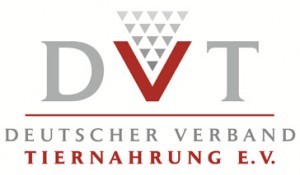 The Deutsche Verband Tiernahrung e. V. (DVT) is the association for the animal feed and nutrition sector. As an independent trade association, it represents the companies that manufacture and trade in feed, premixed feed and additives for livestock and pets.
The Deutsche Verband Tiernahrung e. V. (DVT) is the association for the animal feed and nutrition sector. As an independent trade association, it represents the companies that manufacture and trade in feed, premixed feed and additives for livestock and pets.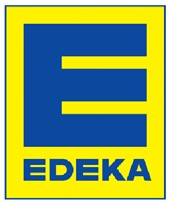 The more than 4,000 independent dealers of the EDEKA association, which represents small and mid-sized businesses and cooperatives, have a unique history going back over 100 years. In 2011, EDEKA, with its 12,000 markets and over 306,000 employees, posted sales of EUR 45.6 billion. EDEKA seeks to contribute to the preservation of nature and resources – also for future generations – and supports the growing availability of environmentally friendly products.
The more than 4,000 independent dealers of the EDEKA association, which represents small and mid-sized businesses and cooperatives, have a unique history going back over 100 years. In 2011, EDEKA, with its 12,000 markets and over 306,000 employees, posted sales of EUR 45.6 billion. EDEKA seeks to contribute to the preservation of nature and resources – also for future generations – and supports the growing availability of environmentally friendly products. Kaiser’s Tengelmann GmbH is part of the Tengelmann Group of Companies, an international trading concern, that also includes the subsidiaries OBI, KiK and Plus Online. The companies in this group are active in 15 European countries and employ some 80,000 people in over 4,000 branches. Its annual sales exceed EUR 10 billion.
Kaiser’s Tengelmann GmbH is part of the Tengelmann Group of Companies, an international trading concern, that also includes the subsidiaries OBI, KiK and Plus Online. The companies in this group are active in 15 European countries and employ some 80,000 people in over 4,000 branches. Its annual sales exceed EUR 10 billion.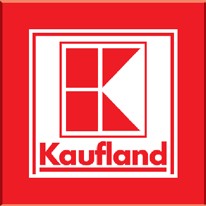 Kaufland Group operates more than 1,000 self-service stores and general stores in Germany and Eastern Europe. The company is located in Neckarsulm, Germany. csr@kaufland.de
Kaufland Group operates more than 1,000 self-service stores and general stores in Germany and Eastern Europe. The company is located in Neckarsulm, Germany. csr@kaufland.de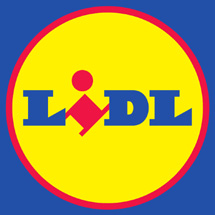 As a member of the Schwarz Group of Companies with headquarters in Neckarsulm, Lidl is among the leading companies in the retail food sector in Germany. The company is also active throughout Europe. In Germany over 30 legally independent regional companies with some 3,300 branches and 65,000 employees work to ensure customer satisfaction.
As a member of the Schwarz Group of Companies with headquarters in Neckarsulm, Lidl is among the leading companies in the retail food sector in Germany. The company is also active throughout Europe. In Germany over 30 legally independent regional companies with some 3,300 branches and 65,000 employees work to ensure customer satisfaction.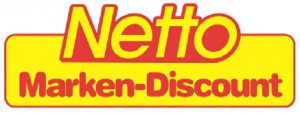 Netto Marken-Discount, a subsidiary of the EDEKA association, offers the best quality at very reasonable prices, and convinces its 19 million customers each week with an attractive choice of over 3,500 items in more than 4,000 Netto outlets. We specialize in fresh regional foods, and our product range is rounded out by a broad Organics selection and environmentally friendly reusable products.
Netto Marken-Discount, a subsidiary of the EDEKA association, offers the best quality at very reasonable prices, and convinces its 19 million customers each week with an attractive choice of over 3,500 items in more than 4,000 Netto outlets. We specialize in fresh regional foods, and our product range is rounded out by a broad Organics selection and environmentally friendly reusable products.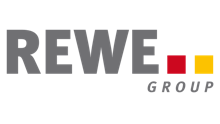 The cooperative REWE Group is one of the leading trade and tourism groups in Germany and Europe. In 2012, the company generated a total external turnover exceeding EUR 50 billion. REWE Group operates 15,500 stores with 327,000 employees in 13 European countries. nachhaltigkeit@rewe-group.com
The cooperative REWE Group is one of the leading trade and tourism groups in Germany and Europe. In 2012, the company generated a total external turnover exceeding EUR 50 billion. REWE Group operates 15,500 stores with 327,000 employees in 13 European countries. nachhaltigkeit@rewe-group.com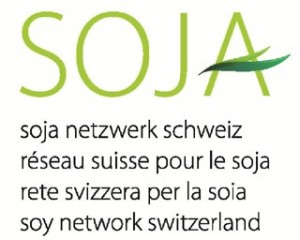 The 14 members of the Swiss soy network represent purchasers, producer associations, labeling and environmental organizations, manufacturers and retailers (Coop, Migros) in the soy sector. Their goal is to convert at least 90% of soy imports to responsible and certified production by 2014. info@sojanetz.ch
The 14 members of the Swiss soy network represent purchasers, producer associations, labeling and environmental organizations, manufacturers and retailers (Coop, Migros) in the soy sector. Their goal is to convert at least 90% of soy imports to responsible and certified production by 2014. info@sojanetz.ch Sonae is the largest Portuguese retail company, with two major partnerships in the shopping centres (Sonae Sierra) and in the telecom, SSI&media sectors (Sonaecom). Sonae is the largest non-financial group, with a consolidated turnover of EUR 5.74 billion in 2011. ptsa@sonae.pt
Sonae is the largest Portuguese retail company, with two major partnerships in the shopping centres (Sonae Sierra) and in the telecom, SSI&media sectors (Sonaecom). Sonae is the largest non-financial group, with a consolidated turnover of EUR 5.74 billion in 2011. ptsa@sonae.pt The SPAR Austria Group is a Central European retail group with outlets in Austria, Italy, Hungary, Slovenia, the Czech Republic and Croatia. In 2012, the SPAR Austria Group achieved an overall turnover of EUR 12.58 billion. www.spar.at/nachhaltigkeit
The SPAR Austria Group is a Central European retail group with outlets in Austria, Italy, Hungary, Slovenia, the Czech Republic and Croatia. In 2012, the SPAR Austria Group achieved an overall turnover of EUR 12.58 billion. www.spar.at/nachhaltigkeit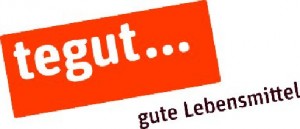 Tegut… is a mid-sized food dealer that for years has stood for conscientious management of food and nutrition issues and their consequences for humans and for nature. This was the basis for our early criticism of Green Gene Technology and our engagement with VLOG (Verband Lebensmittel ohne Gentechnik), the association for food without gene technology.
Tegut… is a mid-sized food dealer that for years has stood for conscientious management of food and nutrition issues and their consequences for humans and for nature. This was the basis for our early criticism of Green Gene Technology and our engagement with VLOG (Verband Lebensmittel ohne Gentechnik), the association for food without gene technology.
Please direct inquiries to: info@brussels-soy-declaration.com
Brussels, May 2012















Thank You ALL for your commitment to Ban GMO Soy and Soy Products by appealing directly to the source.
I WISH the World’s Governments would act as responsibly.
With all due respect, this is not a commitment by these retail chains to avoid the use of GM soy. Read the words carefully. the Declaration is an aspiration and a signal of intent to encourage the production and import of non-GM soy so that it can be used in certain supply lines for those in the shopping public who want nothing to do with GM anywhere in the food chain. It looks to me as if these supermarkets are signalling a willingness to stock certain lines of meat and poultry products from non-GM-fed animals, and a willingness to introduce labelling so as to assist in customer choice. But it looks to me as if all of them will carry on selling products coming from animals fed on GM soy.
Yes absolutely correct Brian – article has been edited accordingly.
Brian John is absolutely correct in his remarks. But if one agrees that such a joint retailer initiative is necessary then this is the best such a group of competitors could do for a start. Those supermarkets who have signed (contrary to others who refused) have had to agree on the biggest common denominator. The necessary harmonization process took several months! But among the signatories, there are already some who would love to go much further.
Whatever the next step may be, we can bet there will be progress from the current position.
But we shouldn’t be surprised if significant progress is “imposed” on Europe by market forces located far away: On 18 April Chinese commodity officials informed a high-ranking Brazilian delegation they now want “10 million metric tons” of conventional, i.e. of GMO-free soybeans. Reason: The new and more affluent Chinese middle class prefers GMO-free food (http://bit.ly/YANg30 – in Portuguese).
Our (European) problem may end up being that others are eating “our” non-GM soy!
I don’t see Tesco listed here.
What is their position?
Tesco’s position is that they will hold down prices at all costs, even if that means squeezing their suppliers mercilessly and agreeing to the use of GM animal feed in all their production lines. They have done a careful calculation and reckon that the furore over allowing GM soy to be used in the feed chain will probably die down, and that those who are concerned will be few enough in number to have no great effect on their profitability, or will move over and buy organic products instead — which will also bring nice profits rolling in. Ethics and UK consumer opinion don’t come into the equation at all.
GMO Is. Dangerous. Eventually. It. Changes. Our. DNA. The. People. Need. To. Fight. Against. What. Is. Being. Put. In. Our. Food. Chain. God. Help. Us. All. Monsanto. Has. The. Seed. Monopoly. Who ever. Tries to. Cross. Them. Are. In for. A. War. Literally.
For me this is CRAZY and BIASED!!!!!!!
Why you don’t published the amount of amazonian jungle chopped down every day and turn in to a super healthy and fantastic GMO free and/or GMO soy bean farms.
Industrialization of food and feeding livestock with soy it’s not the solution.
What about wild life diversity and the planet’s lungs…
Try to grow soy and rise animals without oxygen…
THIS IS THE BIGGEST GREEN WASH I EVER READ!!
As so many people have pointed out, if GMO is so wonderful why is it having to be introduced by stealth and under the radar. If it was really such a good thing why aren’t they labelling everything and advertizing the wonderful merits of this stuff. I would expect it to say something like ‘in scientific tests such and such and so and so’ but the only test that I have heard about are the ones that they don’t want you to know about where DNA gets altered, rats grow tumours and dreadful things happen to pigs’ stomachs. For those who believe GMOs are the answer to everything just read this http://www.naturalnews.com/037665_GMO_scientists_organ_damage.html – an article about the scientist that discovered GMO health hazards and was immediately fired.